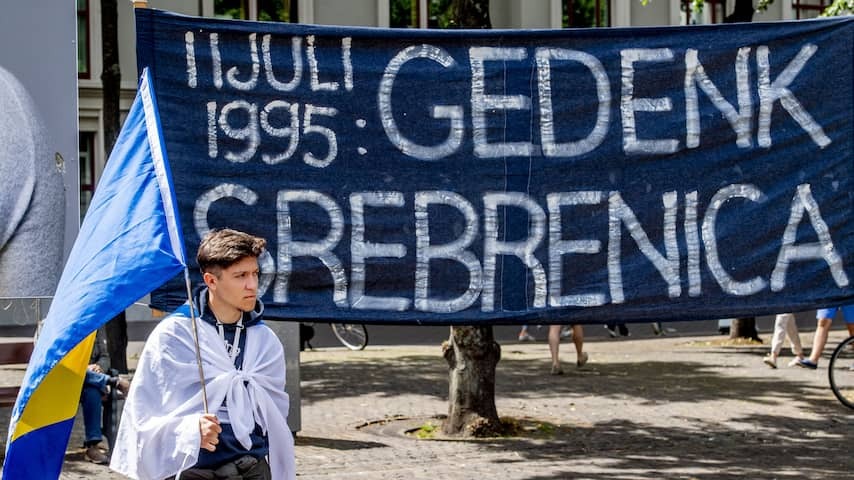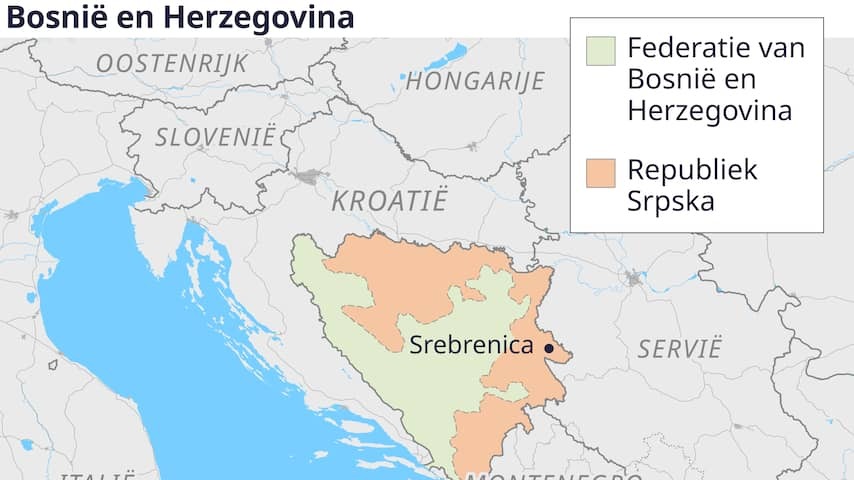
After thirty years, the genocide in Srebrenica is still very relevant. The suffering still divides Bosnia and Herzegovina, and experts see painful similarities with the violence in Gaza. “The international community is watching again and doing too little.”
On July 11, 1995, more than eight thousand Muslim men and boys of the Bosniaks (Bosnian Muslims) were deported and eventually murdered by Bosnian-Serb forces. The Dutch UN unit Dutchbat was present to protect those citizens, but could not prevent the genocide. According to experts, it was the largest genocide in Europe since the Second World War.
Bosnians and relatives still feel little recognition internationally and from the Netherlands. In their own country, there are even parties that deny the genocide. For example, Milorad Dodik, the leader of Republika Srpska, does that. In 1995, Bosnia and Herzegovina was divided into a Bosnian part (the federation) and a Bosnian-Serb part (Republika Srpska), as you can see on the map below.

The memory of Srebrenica in Bosnia and Herzegovina is very political anyway. The Bosnian-Serb forces believed in one large Serbia. That ideology still exists among some Bosnian-Serb communities and politicians.
Srebrenica is located “painfully enough” in the Bosnian-Serb part, says researcher Niké Wentholt, who visited the world-famous town. “Along the road to it, you see monuments that celebrate the aggressive Serbian war. There is also a lot of attention paid to the Bosnian-Serb victims. That is at the expense of the largest group of victims: the Bosniaks. The war for remembrance is still being waged there.”
“Every year on July 11, victims are still buried,” says Bosnian genocide scholar Hikmet Karcic. The Bosnian authorities are still identifying human remains from that time. “The emphasis in the commemoration is on the pursuit of justice.”
Role of the Netherlands is controversial
The role of the Netherlands in the fall of Srebrenica remains controversial for the Bosnians, the experts say. The Dutch blue helmets had to protect the ethnic Muslims as a “neutral peacekeeping force”. But the soldiers were outnumbered, lightly armed and surrounded by the Bosnian-Serb forces of General Ratko Mladic.
Thom Karremans, general of Dutchbat III, eventually handed over Bosnian men and boys to Mladic. That choice was partly the result of the absence of NATO air support and strong attack threats from Mladic.
The Dutch government has formally apologized, most recently in 2022. Dutch courts have also recognized limited liability, after which families of some relatives received compensation.
Many Bosnians – especially survivors and relatives of the victims – hold the Netherlands partly responsible for what happened, says Karcic. “There is an impression that both the Netherlands and the international community abandoned the population of Srebrenica at its most vulnerable.”
Genocide education ‘important’ with an eye on Gaza
Wentholt emphasizes that Srebrenica is part of the Dutch Canon, an overview of important events from history. The researcher calls genocide education “very important”. And not only because it concerns “our” history. According to Wentholt, the lessons of Srebrenica are precisely important with an eye on Gaza.
International aid organizations Amnesty International, Human Rights Watch and Doctors Without Borders have labeled the Israeli violence against the Palestinians in Gaza as a genocide. Many genocide scholars worldwide also agree with this.
Wentholt photographed Palestinian flags in the Bosnian city of Sarajevo last week. The solidarity of the Bosnians with the Palestinians goes beyond those flags, she says. “There is a deep, moral solidarity between them that is rooted in shared sorrow and resistance,” says sociologist Dino Suhonic.
That solidarity goes back at least to 1995. In that year, Palestinians collected aid for Bosnians. Suhonic recently saw an article from a Bosnian newspaper from that time pass by. “I found that very touching.”
‘Does nobody want to hear us?’
Suhonic thought the world had learned from Srebrenica. “But when I look at Gaza, it seems as if remembrance offers no protection. Is our history just a warning that nobody wants to hear?”
Karcic: “For many in Bosnia, this reinforces the belief that the international community has not really learned the lessons of Srebrenica. In particular, the importance of early action, accountability and the protection of civilians in wartime.”
The experts emphasize that the international community is also falling short around Gaza again. “Little is being done to prevent genocide,” says Wenthort. “In the case of Bosnia, a case was already pending before the International Court of Justice before July 11, 1995 to prevent genocide. We as an international community should know better.”